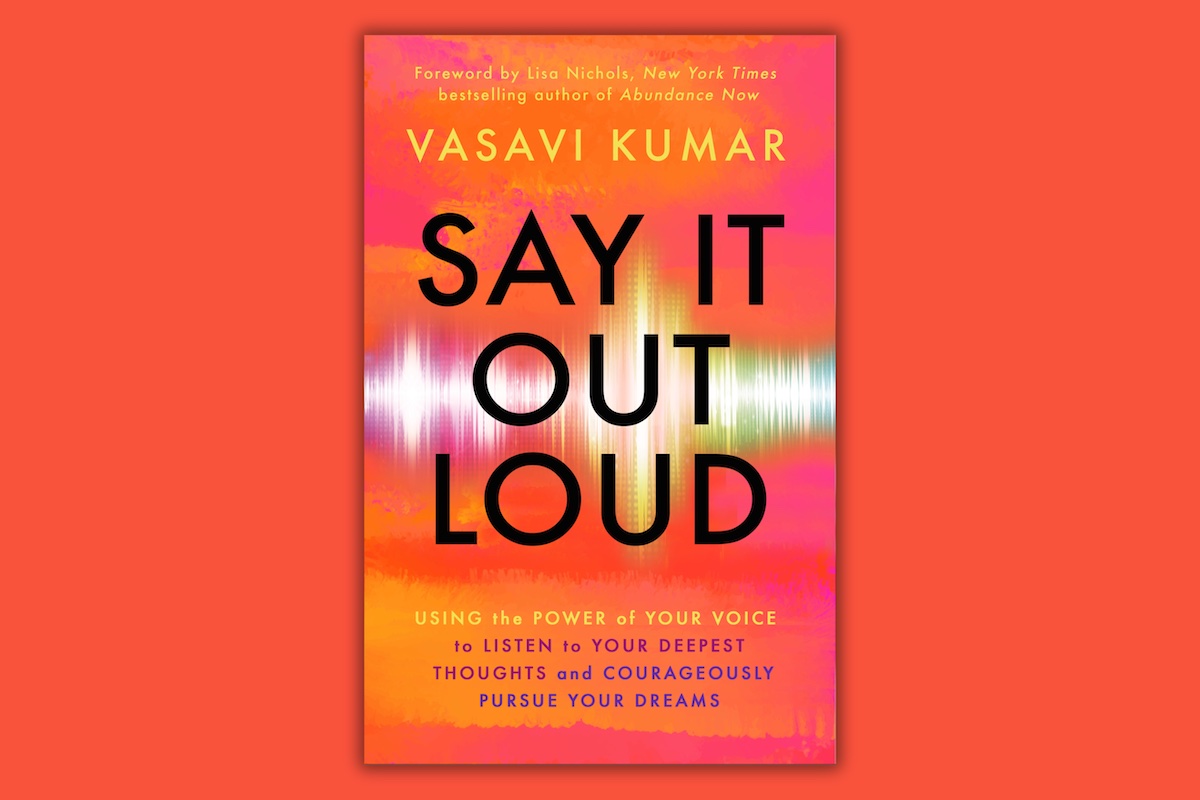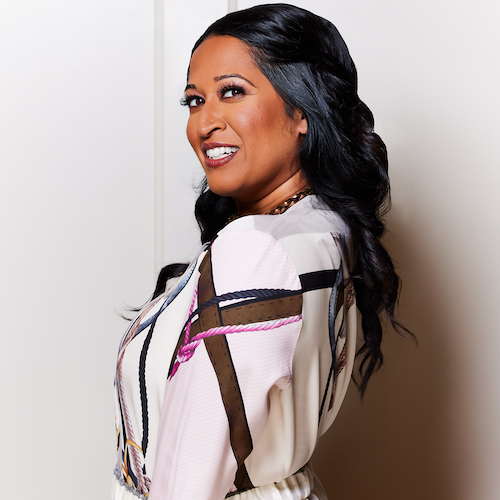
An excerpt from Say It Out Loud by Vasavi Kumar
Answer this out loud: Do you think it’s weird to talk to yourself out loud?
Is there any part of you that thinks it’s weird to talk to yourself out loud? If you answered yes, I want to celebrate you for exploring an idea that makes you uncomfortable. If you answered no, then welcome! You’re in the right place. And if you’re on the fence, stay curious and open. In this chapter, you’re going to learn different ways of talking to yourself, plus the mechanics of how to talk to yourself, which is foundational to receiving the benefits of the Say It Out Loud exercises at the end of each chapter.
From early childhood, our inner dialogue (also sometimes referred to as self-talk or thinking to yourself) plays an essential role in how we think, feel, and act. And while you may be the type of person who keeps your inner dialogues hidden (except for a few mortifying moments here and there), what you’re telling yourself and how you’re speaking to yourself internally are far more important than you realize. Think about how many times you’ve prepared to have a difficult conversation with your boss, friend, partner, or family member. Rehearsing what you want to say, predicting what they might say — all this helped you to prepare for the possible best-case and worst-case outcomes, didn’t it? You internally played out every potential scenario to guard you against any surprising attacks from the other person. You went in equipped with the perfect strategy to avoid as much pain as you could. Your inner dialogue can be your greatest ally when getting ready for difficult conversations and other stressful situations.
Your inner dialogue can also be your biggest hater. As human beings, we cannot help but judge everything and everyone around us. Raise your hand if you love people watching! It’s entertaining to observe people and make up scenarios and stories about their lives. We create stories in our head about the people we see while scrolling through Instagram, or when a friend doesn’t invite us to their birthday party, or when we’re on the receiving end of a cashier’s bad day at the grocery store. And while this may seem harmless and even feel like fun and games sometimes, think about when you turn that inner dialogue against yourself — for example, when you compare yourself to that influencer you saw on Instagram and tell yourself that your life isn’t as fabulous as theirs and you clearly are falling behind, or you tell yourself that you’re unlucky and good things just don’t happen to you. The truth is, the stories and judgments that you have about yourself can be detrimental to your mental and emotional health, making it difficult to even take the first step toward courageously pursuing your dreams.
Why would you drown yourself in criticism and cruelty? All I’m saying is, be kind to yourself. Stop judging your every move. In the moments of quiet when you notice your thoughts are beating you up, practice saying them out loud so you can respond with love. Remember, you’re learning how to talk to yourself. You’re replacing the mean thoughts with loving ones, through your spoken words. And once you find your authentic way of speaking to yourself, your so-called judgments will stop feeling so judgy, and you will sharpen your discernment regarding what you want and what you don’t want in your life. For example, rather than saying to yourself, “I’m so bad with money,” when you learn how to speak to yourself, the conversation might sound like, “I’m smart and savvy enough to figure out my finances.” Boom! You go from being someone who is “bad with money” to someone who is “smart and savvy.” From there you focus on seeking solutions, rather than shaming yourself. Way more helpful, don’t you think? If you’re going to judge yourself, judge with the intention of understanding yourself. Start understanding yourself, and you’ll stop being so scared of other people judging you.
Being clear and honest with others is the foundation for healthy and fulfilling relationships. The way you communicate with others is a direct reflection of how you communicate with yourself. The thoughts you think, which are nothing more than words guiding you daily, will directly impact how you speak to others. So it follows that when you learn how to talk to yourself with kindness, respect, and compassion, you will be able to extend that to others. This does not mean you put up with people overstepping your boundaries. In fact, quite the opposite. When you talk to yourself with respect, you will no longer tolerate mistreatment from others, and you will be able to state your boundaries out loud.
You’re not crazy for talking and responding to yourself out loud.
When I returned to playing tennis a few years ago, one thing became abundantly evident to me: how I spoke to myself on the court (both out loud and internally) had a direct impact on my performance. Whether we’re playing a sport or attempting to practice a new musical instrument or read a book, our inner speech will either psych us up or convince us to throw in the towel and walk away. Our self-talk affects everything from our emotional control to our management of stress, anxiety, and depression. The right inner dialogue not only helps us overcome self-doubt and fear of failure, but it also helps us stay motivated.
The voices in your head that seem to have a nonstop commentary about every little thing you do, see, feel, think, and experience shape your entire reality. Often, we get stuck in a never-ending downward spiral of thoughts and “what if” scenarios. Running these kinds of thoughts through your head keeps the chaos alive. Actively asking and responding to questions out loud can help turn your jumble of thoughts into a more organized system.
And if you still need a bit of persuading that you’re not crazy for talking to yourself out loud, here it is. Have you ever seen a small child talking to themselves while performing a task? Whether they’re learning to tie their shoelaces, role-playing characters, or working through a difficult task, children naturally speak their thoughts out loud as they begin to explore the world around them and develop language. The question then becomes, At what point did our outer speech become inner speech as we got older? If as children we would talk out loud to ourselves to direct our behavior, when did we stop saying it out loud? Most likely when we first encountered condemnation for speaking the truth.
That’s the irony. We’re told to tell the truth and then punished when we do. Whether love was withheld or we were met with disapproval for speaking our minds, the underlying message was, “Tell the truth, but not too much of it, because if you do, you might upset someone.” Or “Don’t act like you’re disappointed, because then you might make someone feel bad.” We continue to tell white lies to others, and even bigger ones to ourselves, all so we can ensure that people won’t feel bad or abandon us. If our out-loud speech — the purest form of creation — guided our intellect and behavior as children, wouldn’t it make sense that saying it out loud as adults leads to courageously pursuing our dreams? There’s one way to find out: #sayitoutloud.
It’s not just what you say; it’s how you say it.
The approach I use to speak to myself has softened tremendously throughout the course of my life. Growing up in a first-generation Indian immigrant home, I was terrified of my mother. She could simply say, “Vasavi, inga va,” which translates to “Vasavi, come here,” and my heart would beat faster. Her tone of voice jolted my nervous system. As an adult, I respect her directness. She doesn’t sugarcoat anything. But my nervous system didn’t quite get that as a young child. And I’m mindful today of the fact that if I use a harsh or loud tone with my inner child, she will curl up in the fetal position. This is why I’m encouraging you to speak out loud. You cannot run from the harshness of your own tone that you use with yourself when you say it out loud. My hope is that when you hear how you’re speaking to yourself, you will choose a kinder approach as an act of self-respect.
Our internal monologue communicates with us throughout the day; for some people, it goes nonstop. Whether you’ve been aware of your inner voice or you’re now waking up to the dialogue that has been running in the background of your mind, there are small shifts you can make in the language you use to communicate with yourself, which can influence your ability to regulate your thoughts, emotions, and behavior in stressful situations. It’s not just the ability to talk to yourself that has an impact, but the nuances of communicating, such as tone, volume, playfulness, and using our first name in self-talk. The tone you use with yourself affects how you feel in your own presence. If the way you speak to yourself has a harsh and unkind tone, then of course you’re going to feel attacked by your own mind. Do you speak loudly to yourself to get motivated? Has it been working for you? Maybe it’s time to use a softer volume. Or have you noticed that when you’re lighter and sillier with yourself, you actually manage to move through challenges a lot more easily? Using a more playful approach with yourself might just be the key to moving through your fears. Do you use harsh words to motivate yourself? Using your first name might be more effective and less damaging to your psyche. There’s no “right” way to say it out loud, but there are guidelines that will make this process enjoyable and open your heart back up to yourself.
Excerpted from the book Say It Out Loud: Using the Power of Your Voice to Listen to Your Deepest Thoughts and Courageously Pursue Your Dreams ©2023 by Vasavi Kumar. Printed with permission from New World Library — www.newworldlibrary.com
We’d love to hear from you! Please send us your suggestions for future articles. And if you’re a writer, please see our writer’s submissions page for details.

